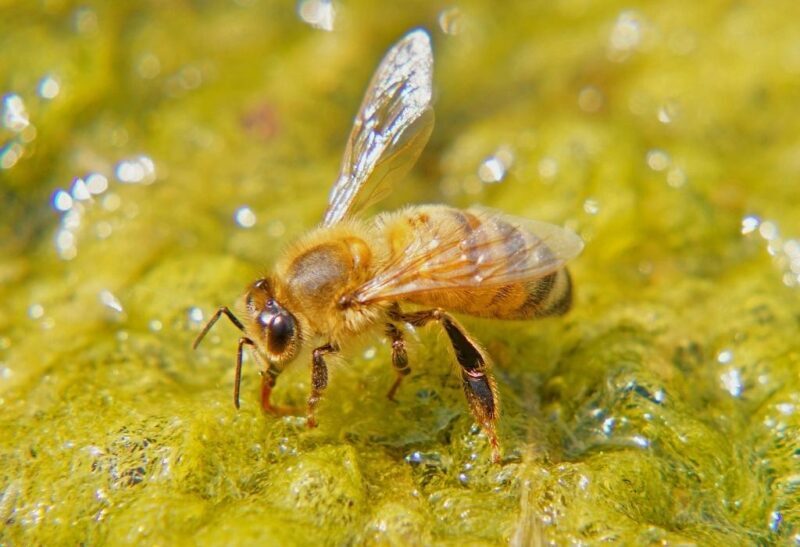During the day, you can always observe bees as they happily buzz around and fly from flower to flower to collect nectar and pollen. But, have you ever wondered what they do once the sun has set? Are they as busy during the night? That’s what you’ll learn all about from this article.
Some bees do fly at night. Studies reveal that 1% of the total bee species are nocturnal, such as the Indian carpenter bee. These bees have enlarged ocelli that help them navigate and forage in the darkness.
Because of their apposition compound eye structure, bees see more vividly during the daytime when light is abundant. But even then, other bees can fly at night since they are capable of sensing electric fields that help them make their way through flower fields and back home. Isn’t that impressive? Read on to know more interesting facts about bees and their nighttime activities.
Table of Contents
Can Bees Fly at Night?
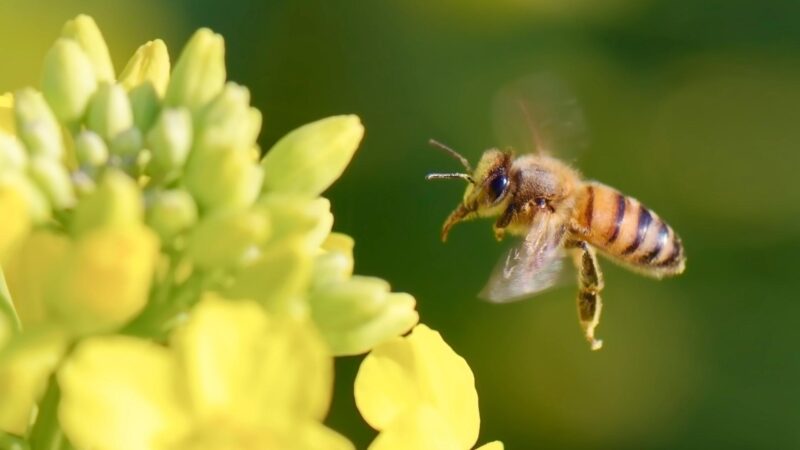
Some bees can fly at night. However, the capacity for nighttime flight in bees is more of an exception – with only a limited subspecies capable of navigating and foraging in the dark.
In general, bees do not fly at night. They have what is referred to as “apposition compound eyes”, which means that each lens has a set of photoreceptors that act independently of each other. As a result, they see quite clearly during the day, but this may not be the case once the light source becomes limited. As a result of their limited night vision, most bees prefer to engage in their activities during the day and head back to the hive before the sun sets.
However, some bee species are nocturnal, such as the Indian carpenter bee. Nocturnal bees comprise only 1% of the total bee species, and that makes them quite rare. These nighttime bees have enlarged ocelli that allow them to detect more light sources to help them fly at night. But even then, their vision in the dark is still quite limited.
It’s also interesting to note that bees can see UV light. They also have impressive sensors that can detect electric fields. These also help them navigate in the dark.
Do Bees Attack at Night?
Bees may attack at night if they deem it necessary for their protection. Except for the Africanized honey bee, most bee species are docile. They are only known to attack when they feel threatened or when they are agitated, regardless of the time of day. Thus, bees will not hesitate to attack at night if they feel the need to defend themselves.
What Do Bees Do at Night?
Bees are mostly diurnal beings. That means that they are more active during the day than they are at night. Like most diurnal animals, bees spend most of the night getting some rest.
In contrast, nocturnal bee species use the nighttime to search for food. These bees take advantage of the darkness to avoid their predators and spend most of the day getting some rest.
Where Do Bees Go at Night?
Diurnal bees that live in colonies spend the night in their respective hives. On the other hand, solitary diurnal bees often spend the night in their nests or on flowers. It has been observed that diurnal bees start to head back to their hives or nests even before the sun sets, giving them enough time to navigate their way back before it gets dark.
In contrast, nocturnal bees start to become active at dusk or once the darkness has set in. This is the time when they start to forage and collect nectar and pollen from flowers.
What Do Bees Fly at Night?
Bees that do fly at night are quite rare. They only comprise around 1% of the total bee species, which includes certain sub-species from the Colletidae, Andrenidae, Apidae, and Halictidae bee families. But even then, only the giant Indian carpenter bee is known to be truly nocturnal.
Other bee species known to fly at night are mainly crepuscular. This means that they are active during the twilight time, which is near-darkness. Bees that belong to this category are the Central American sweat bee, the Asian honey bee, and the African honey bee.
Do Bumble Bees Fly at Night?
Bumble bees are not known to fly at night. This bee species is known as active daytime foragers, so they spend their nights resting in their hives.
Do Carpenter Bees Fly at Night?
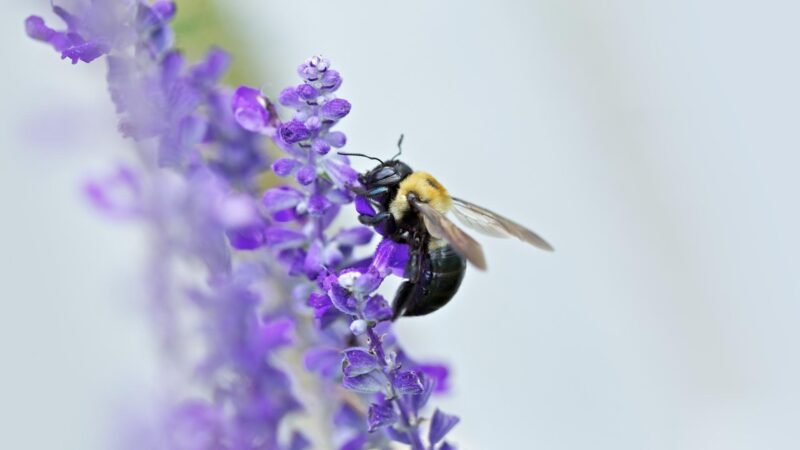
In general, carpenter bees are diurnal. They are known to forage during the day, particularly during early springtime until the summer season.
By way of exception is the giant Indian carpenter bee. This carpenter bee subspecies is the only known truly nocturnal bee. Experts believe that their ability to navigate in the dark is due to their large and bulging ocelli, which help detect more light sources to see better at night.
Do Honey Bees Fly at Night?
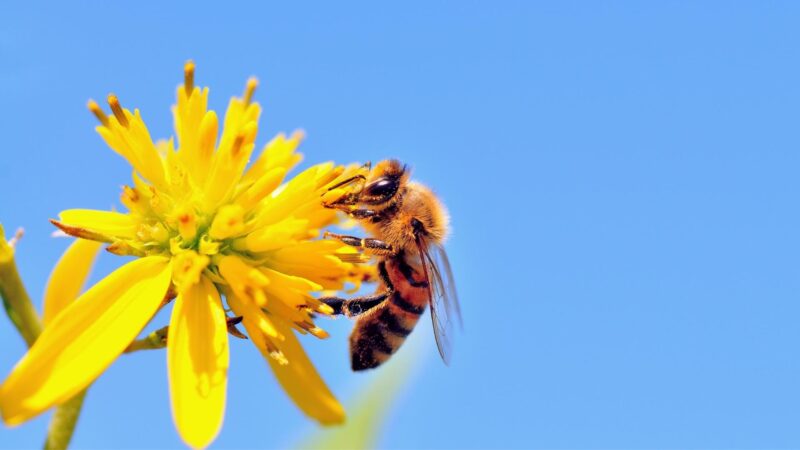
Some honey bee subspecies are known to fly at night. Like most bees, honey bees are generally active day foragers. This is because it is easier to find fields of flowers when the sun is out.
However, the Asian honey bee and African honey bee are known to be active at dusk, making them crepuscular beings. While they are not truly nocturnal, they are still capable of flying and foraging at night.
Interestingly, it has been observed that honey bees are prone to be infected by what experts refer to as the zombie fly. This fly causes honey bees to become parasitized and fly out of their hives in a seemingly disoriented state – even in the darkness of the night.
These parasitized honey bees are reported to fly aimlessly with no direction and are particularly drawn to light sources such as porch lamps. Nevertheless, this phenomenon is caused by a parasitic fly, and the unaffected honey bees will not bother to fly out at night.
Do African Bees Fly at Night?
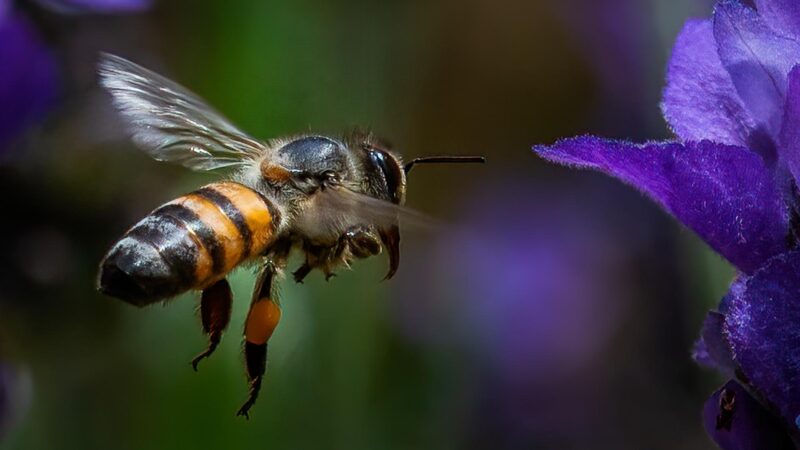
African bees fly at night. This bee subspecies belongs to the honey bee family and is more often referred to as Africanized honey bees. The African bee has notably bulbous eyes, which are larger than that of the common honey bee. That allows them to see better at night, although at a limited capacity. Nevertheless, it is enough to help them forage and find their way back to the hive.
However, the Africanized honey bee is not considered a nocturnal bee. It is, at most, a crepuscular bee.
Do European Honey Bees Fly at Night?
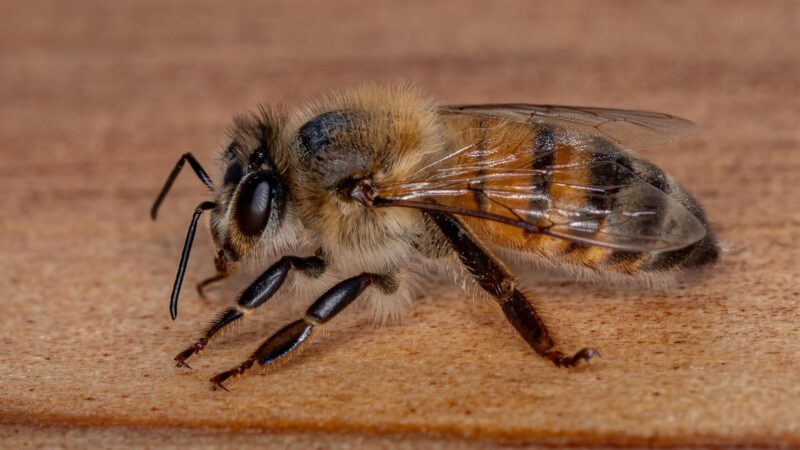
European honey bees do not fly at night. This bee subspecies is the most common type of honey bee around the world. It is in their nature to be active daytime foragers, and that leaves them to spend their nights getting some rest inside their hives.
What Do Bees Do at Night?
A majority of bees use the nighttime to rest and recharge for the next day. In contrast, a tiny percentage of night-active bees use this time to forage.
Experts believe that the reason why some bees prefer to forage at night is mainly to avoid predators. Since most predatory creatures are diurnal, it follows that they are also asleep during the night.
Additionally, foraging at night means that there are fewer competitors around. In most cases, only bats and a few nocturnal wasps forage at this time, so nocturnal and crepuscular bees are free to hop around from flower to flower.
What Do You Do if You Find a Bee at Night?
If you find a bee at night, the best thing to do is to simply leave them alone. Whether it’s a nocturnal bee looking for food or a solitary diurnal bee getting some rest on a flower, you should simply let them go on with their business. If you try to do anything to them – even if it seems harmless – they might think of it as an attack and sting you in return. Thus, it’s best to leave them alone.
Can Bees See at Night?
Bees can still see at night, although it may not be as clear and sharp as their daytime vision. As earlier discussed, bees have apposition compound eyes, which provide them with the best vision when there is enough light source available. Once it gets dark, bees may struggle to see what’s around them. However, that doesn’t mean that they are completely blind.
Interestingly, what helps them navigate is their ability to sense electric fields. It has also been observed that bees become familiar with structures near their hives, and that helps them find their way back once the darkness has set it.
Are Bees Afraid of Humans?
Bees are not afraid of humans. Bees simply go about with their life and just exist with humans. They are not known to bother or run away from humans just because one is nearby. In fact, most bee species are docile towards humans.
However, they are known to attack humans when they sense danger. Even by simply swatting them away, they can interpret it as an attack – which causes them to retaliate by stinging. This should not be interpreted as bees being afraid of humans.
In general, bees are diurnal insects. They prefer to forage during the daytime when they can take advantage of their impressive apposition compound eyes. Nevertheless, there are some bees with enlarged ocelli that help them see better in the dark. Others use their senses to detect electric fields to navigate – even with their poor nighttime vision. This goes to show how truly fascinating bees are.
List of Sources
Warrant, E. J. (2008). Seeing in the dark: vision and visual behaviour in nocturnal bees and wasps. The journal of experimental biology.
Warrant, E. J. (2007). Nocturnal bees. Current biology.
Liporoni, R., et al. (2020). Light intensity regulates flower visitation in Neotropical nocturnal bees. Scientific Reports.
Moya, M. J. (2022). Bee home before dark. Why honey and bumble bees can’t fly at night. UC Riverside College of Natural & Agricultural Sciences.
Borges, R. M., Somanathan, H., Kelber, A. (2016). Patterns and Processes in Nocturnal and Crepuscular Pollination Services. University of Chicago Press Journals.
